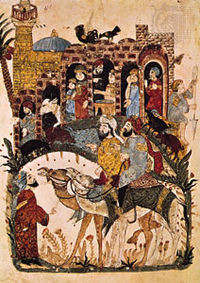
Al-Hariri of Basra
Encyclopedia

Arab
Arab people, also known as Arabs , are a panethnicity primarily living in the Arab world, which is located in Western Asia and North Africa. They are identified as such on one or more of genealogical, linguistic, or cultural grounds, with tribal affiliations, and intra-tribal relationships playing...
poet, scholar of the Arabic language
Arabic language
Arabic is a name applied to the descendants of the Classical Arabic language of the 6th century AD, used most prominently in the Quran, the Islamic Holy Book...
and a high government official of the Seljuk Empire
Great Seljuq Empire
The Great Seljuq Empire was a medieval Persianate, Turko-Persian Sunni Muslim empire, originating from the Qynyq branch of Oghuz Turks. The Seljuq Empire controlled a vast area stretching from the Hindu Kush to eastern Anatolia and from Central Asia to the Persian Gulf...
. Born in Basra
Basra
Basra is the capital of Basra Governorate, in southern Iraq near Kuwait and Iran. It had an estimated population of two million as of 2009...
in modern-day Iraq
Iraq
Iraq ; officially the Republic of Iraq is a country in Western Asia spanning most of the northwestern end of the Zagros mountain range, the eastern part of the Syrian Desert and the northern part of the Arabian Desert....
, he is best known for writing Maqamat al-Hariri
Maqama
Maqāma are an Arabic literary genre of rhymed prose with intervals of poetry in which rhetorical extravagance is conspicuous. The 10th century author Badī' al-Zaman al-Hamadhāni is said to have invented the form, which was extended by al-Hariri of Basra in the next century...
(مقامات الحريري, The Assemblies of al-Hariri), a virtuosic display of saj'
Saj'
Saj‘, is a form of rhymed prose in Arabic literature. It is named so because of its evenness or monotony, or from a fancied resemblance between its rhythm and the cooing of a dove. It is a highly artificial style of prose, characterized by a kind of rhythm as well as rhyme...
, consisting of 50 anecdotes written in stylized prose, which was once memorized by heart by scholars, and Mulhat al-i'rab fi al-nawh, an extensive poem on grammar. The most famous translation of his maqama
Maqama
Maqāma are an Arabic literary genre of rhymed prose with intervals of poetry in which rhetorical extravagance is conspicuous. The 10th century author Badī' al-Zaman al-Hamadhāni is said to have invented the form, which was extended by al-Hariri of Basra in the next century...
t was a German version by the poet and Orientalist
Oriental studies
Oriental studies is the academic field of study that embraces Near Eastern and Far Eastern societies and cultures, languages, peoples, history and archaeology; in recent years the subject has often been turned into the newer terms of Asian studies and Middle Eastern studies...
Friedrich Rückert
Friedrich Rückert
Friedrich Rückert was a German poet, translator, and professor of Oriental languages.-Biography:Rückert was born at Schweinfurt and was the eldest son of a lawyer. He was educated at the local Gymnasium and at the universities of Würzburg and Heidelberg. From 1816-1817, he worked on the editorial...
as Die Verwandlungen von Abu Serug and sought to emulate the rhymes and wordplay of the original.
Some of his other works include a book on errors of expression in Arabic, Durrat al-ghawwāṣ fī awhām al-khawaṣṣ. The Assemblies of al-Hariri recounts in the words of the narrator, al-Harith ibn Hammam and al-Hariri's several encounters with artist Abu Zayd al-Saruji.

